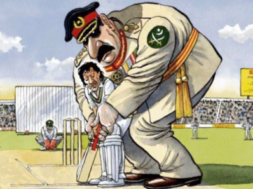
It’s not cricket: Imran admits he failed to make a “Naya Pakistan”
Virendra Pandit
New Delhi: In 2018, he came to power on the back of a promise to make a “Naya Pakistan”; then he vowed to make Pakistan a “Riyasat-e-Medina”.
Nearly four years later, Prime Minister Imran Ahmed Khan Niazi, the 69-year-old former cricketer-turned-politician whom Pakistanis once admired as “Kaptan”, has merely aped his clansman Lieutenant-General Amir Abdullah Khan Niazi. The General had the dubious distinction of surrendering about 93,000 Pakistani soldiers before his Indian counterpart, Lt. Gen. J S Aurora in Dhaka in December 1971, as Old Pakistan yielded a New Bangladesh.
While Lt. Gen. Niazi surrendered before the Indian Army, Imran has admitted failure in living up to the promises he had made to his own people.
Vindicating his critics that he had failed on all fronts, Imran said on Thursday: “In the beginning, I wanted to bring ‘revolutionary changes’….The The biggest problem is that there has been no connection between the government and the interest of the country,” the media reported.
Speaking, ironically, at a government ceremony to felicitate the top 10 best performing ministries and divisions, he said the ministries have not given the desired results. “Are our ministries performing how to stabilize the country through increasing exports and how the condition of the people can be improved, how poverty can be eliminated?” he asked.
He admitted that his government could not bring the promised “changes” because of bureaucratic “faults” of the system, which, ironically again, he presides over himself.
Blaming the “system” he said he later realized that it was incapable of absorbing shocks.
Rising fuel and electricity costs have increasingly pressured Imran Khan’s government, in whose tenure Pakistan has descended into near bankruptcy and is begging worldwide for bailouts to avert the defaulter’s tag.
At the time of the 2018 General Elections, his Pakistan Tahreek-e-Insaf-led party alliance was seen as an alternative to the system marred by major corruption and bureaucracy issues in the previous governments.
Pakistan’s debt-bound economy has long been hobbled by problems ranging from a wasteful and inefficient power sector to weak tax collection, poor productivity, and minimal value-added exports.
In January, the Imran government passed a mid-year budget, increasing taxes to control the fiscal deficit. This was seen as a move to improve the chances of a successful review of its International Monetary Funded program.
His open admission of failure resulted in a predictable opposition onslaught.
The Pakistan Democratic Movement (PDM), a ragtag alliance of anti-Imran parties, has said it would table a no-confidence motion against Imran Khan in the Parliament.
Its chief Fazlur Rehman told reporters in Lahore that the group would approach the government’s allied parties to get them on board to gain a voting majority in the National Assembly to oust Imran Khan.
However, he gave no timeline.














